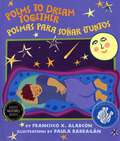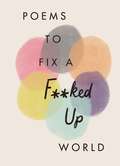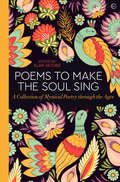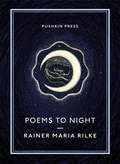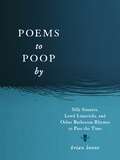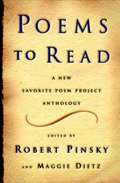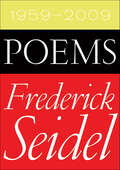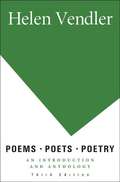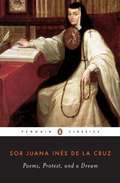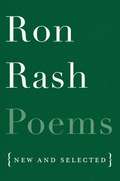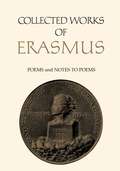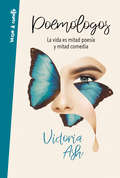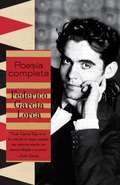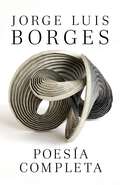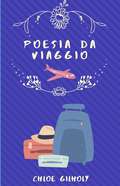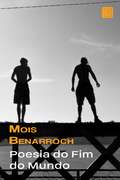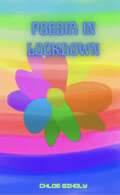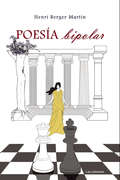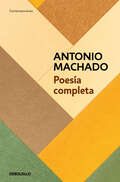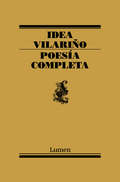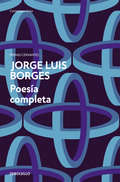- Table View
- List View
Poems to Dream Together: Poemas para soñar juntos
by Francisco X. AlarcónA bilingual collection of poetry by acclaimed Chicano poet Francisco X. Alarcón celebrating family, community, nature, and the positive power of dreams to shape our future.A young boy dreams that "all humans / and all living / beings / come together / as one big family / of the Earth." So begins this delightful bilingual collection of poems by Francisco X. Alarcón. As we travel through the boy's colorful universe, we learn about his family and community working together and caring for each other and the world in which they live. Neighbors help repair adobe homes. The boy and his family share old photographs, tend their garden, and pamper Mamá who "works day and night." Tribute is paid to those who toil in the fields, and to César Chávez. Most of all, we see how dreams can take many forms, from the fantastic imaginary ones that occur while we sleep to the realistic ones that guide our lives and give us inspiration for the endless possibilities of the future. Partly based on Alarcón's own dreams and family memories of growing up in Mexico and California, and vibrantly illustrated by Paula Barragán, these joyous, universal poems will inspire all readers to dream their own dreams for a better, compassionate, and loving world. "Close your eyes / and now get ready / to hop on a dream."
Poems to Fix a F**ked Up World
by Various PoetsSometimes it's hard to keep looking up at the stars when the gutter we're in seems so full of sh*t. But isn't that why we need poetry? Oscar Wilde wrote some of his best poetry when he was in prison for 'the love that dare not speak its name'. Nelson Mandela held fast to his 'unconquerable soul' on Robben Island with the help of the words a poet wrote about his battle with tuberculosis a century before. So maybe it's not inconceivable that the words in this little book could help you put some of the sh*t in perspective, get all the important bits of your life - like sleep, work, food, travel, love and learning - in some kind of balance, so you can go back to star-gazing again . . . Taking as its starting point the classic 'wheel of balance' life-coach model, this beautifully packaged collection of extracts and short poems gathers wisdom old and new in a perfect gift for anyone who needs comfort in this f**ked up world of ours.'This is not a poetry book as you know it, this is a life raft.' Emerald Street on Poems for a World Gone to Sh*t.
Poems to Fix a F**ked Up World
by Various PoetsSometimes it's hard to keep looking up at the stars when the gutter we're in seems so full of sh*t. But isn't that why we need poetry? Oscar Wilde wrote some of his best poetry when he was in prison for 'the love that dare not speak its name'. Nelson Mandela held fast to his 'unconquerable soul' on Robben Island with the help of the words a poet wrote about his battle with tuberculosis a century before. So maybe it's not inconceivable that the words in this little book could help you put some of the sh*t in perspective, get all the important bits of your life - like sleep, work, food, travel, love and learning - in some kind of balance, so you can go back to star-gazing again . . . Taking as its starting point the classic 'wheel of balance' life-coach model, this beautifully packaged collection of extracts and short poems gathers wisdom old and new in a perfect gift for anyone who needs comfort in this f**ked up world of ours.'This is not a poetry book as you know it, this is a life raft.' Emerald Street on Poems for a World Gone to Sh*t.
Poems to Make the Soul Sing: A Collection of Mystical Poetry through the Ages
by Alan JacobA beautifully designed collection of mystical poems to soothe, inspire and rejuvenate the soul. With a body of work spanning the centuries, from the Vedas to St Teresa of Avila, Rumi and Rilke, and arranged by transcendent themes, this book will connect readers with nature, with the stillness within themselves and with the Divine. When your soul hungers for peace, knowledge or comfort, there is no answer as profound as poetry. In a world that is increasingly noisy and disconnected from the Divine, this wonderfully inspiring collection of poems for the soul from mystics of all traditions encourages readers to listen to their own hearts, marvel at the wonder of nature and explore profound truths of life, death, eternity and God. With its elegant design and comprehensive selection of poets, the volume is ideal for gifting. Themed chapters allow readers to choose topics to explore, including: DIVINITY – what is the nature of God or the One? TRANSCENDENCE – what deep truths can we find in our spiritual quest? LOVE – how can we give and cherish most profoundly? DEVOTION – how should we explore and affirm our faith? PEACE – how can we find stillness amidst turmoil and loss? NATURE – what lessons can we learn from creation? SPIRIT – what is sacred about the individual self? From the Bhagavad Gita, the Vedas and the Song of Solomon to the Divine Comedy and the Rubaiyat of Mar Khayyam, readers will find all the great mystical writers, including Attar, Ansari, St Francis of Assisi, Lao Tzu, John Donne, John Bunyan, Gerard Manley Hopkins, Elizabeth Barratt Browning, Christine Rossetti and Walt Whitman, as well as many fine but lesser-known spiritual writers. A book to give as a thoughtful gift, and also one to treasure.
Poems to Night
by Rainer Maria RilkeA collection of haunting, mystical poems of the night by the great Rainer Maria Rilke - most of which have never before been translated into EnglishOne night I held between my handsyour face. The moon fell upon it.In 1916, Rainer Maria Rilke presented the writer Rudolf Kassner with a notebook, containing twenty-two poems, meticulously copied out in his own hand, which bore the title "Poems to Night." This cycle of poems which came about in an almost clandestine manner, are now thought to represent one of the key stages of this master poet's development.Never before translated into English, this collection brings together all Rilke's significant night poems in one volume.
Poems to Poop by: Silly Sonnets, Lewd Limericks, and Other Bathroom Rhymes to Pass the Time
by Brian BooneCheeky verse for loads of bathroom fun!“Brilliant from one end to the next!” —T. P. Eliot, “The Waste Land”“A literary laxative for our times!” —Elizabeth Barrett Browning, “To Flush, My Toilet”Poems to Poop by will relax and entertain you and your bathroom guests whenever nature calls. Find humor and relief in this witty, toilet-friendly treasury featuring hundreds of outhouse odes, poo haikus, Insta-poems, and joyfully silly rhymes to pass the time. Keep this colon-clearing collection toilet-side or take it with you wherever you go!- Treat yourself to a poetic poop break anytime you need it- Enjoy updated classics like “Tinkle, Tinkle, Little Star,” “One Flush, Two Flush,” and “Stopping to Pee on a Snowy Evening”- Indulge your love of bathroom humor with verse that’s sure to move you
Poems to Read: A New Favorite Poem Project Anthology
by Robert Pinsky Maggie DietzPoems to Read is a welcoming avenue into poetry for readers new to poetry, including high school and college students. It is also meant to be a fresh, valuable collection for readers already devoted to the art. This anthology concentrates on the actual pleasures of reading poems: hearing the poem in your voice, bringing it to other people, musing about it, taking excitement or comfort from it, wandering with it or as in the Keats letter quoted in the Introduction having it as a starting post. Many of these 200 poems are accompanied by comments from readers of various ages, regions, and backgrounds who participated in the Favorite Poem Project. Included are poems by John Donne, Walt Whitman, William Butler Yeats, Langston Hughes, Elizabeth Bishop, Gwendolyn Brooks, Seamus Heaney, Allen Ginsberg, and Louise Glück, to name a few. The editors offer their own comments on some of the poems, which are arranged in thematic chapters.
Poems, 1959–2009
by Frederick SeidelThese are the collected poems of a master whose work includes many of the most compelling, savage, and tender poems in the language. Frederick Seidel is, in the words of the critic Adam Kirsch, "the best American poet writing today."
Poems, Poets, Poetry: An Introduction and Anthology,Third Edition
by Helen VendlerMany students today are puzzled by the meaning and purpose of poetry. Poems, Poets, Poetry demystifies the form and introduces students to its artistry and pleasures, using methods that Helen Vendler has successfully used herself over her long, celebrated career. Guided by Vendler’s erudite yet down-to-earth approach, students at all levels can benefit from her authoritative instruction. Her blend of new and canonical poets includes the broadest selection of new and multi-racial poets offered by any introductory text. Comprehensive and astute, this text engages students in effective ways of reading — and taking delight in — poetry.
Poems, Protest, and a Dream
by Margaret Sayers Peden Sor Juana Ines de la CruzSor Juana Ines de la Cruz (1648-1695) wrote her most famous prose work, La Respuesta a Sor Filotea, in 1691 in response to her bishop's injunction against her intellectual pursuits. A passionate and subversive defense of the rights of women to study, to teach, and to write, it predates by almost a century and a half serious writings on any continent about the position and education of women. Moreover, notes Ilan Stavans in his introduction, it has become "a cornerstone of Hispanic-American identity ... at once a chronicle of the tense gender relations in the Western Hemisphere, a rich portrait of the social behavior that prevailed more than a century before independence from Spain was gained in 1810, and the very first intellectual autobiography written by a criolla in a hemisphere known for its solipsism, introversion, and allergy to public confessions. Also included in this wide-ranging selection is a new translation of Sor Juana's masterpiece, the epistemological poem "Primero Sueno, " as well as revealing autobiographical sonnets, reverential religious poetry, secular love poems (which have excited speculation through three centuries), playful verses, and lyrical tributes to New World culture that are among the earliest writings celebrating the people and the customs of this hemisphere.
Poems-and-Quotes-of-Abdul-Kalam
by Yercaud ElangoDr APJ Abdul Kalam was not only a great Scientist, but also a great Writer and Poet. This book compiles some of his poems and quotes which he delivered during his numerous meetings with school and college students.
Poems: New and Selected
by Ron RashA collection of haunting lyricism that evokes the beauty and hardship of the rural South, by a revered American master of letters--the award-winning, bestselling author of the novels Serena, Something Rich and Strange, and Above the Waterfall.In this incandescent, profound, and accessible collection, beloved and award-winning poet, novelist, and short-story writer Ron Rash vividly channels the rhythms of life in Appalachia, deftly capturing the panoply of individuals who are its heart and soul--men and women inured to misfortune and hard times yet defined by tremendous fortitude, resilience, and a fierce sense of community.In precise, supple language that swerves from the stark to the luminous, Rash richly describes the splendor of the natural landscape and poignantly renders the lives of those dependent on its bounty--in cotton mills and tobacco fields, farmlands and forests. The haunting memories and shared histories of these people--their rituals and traditions--animate this land, and are celebrated in Rash's crystalline, intensely imagined verse.With an eye for the surprising and vivid detail, Ron Rash powerfully captures the sorrows and exaltations of this wondrous world he knows intimately. Illuminating and indelible, Poems demonstrates his rich talents and confirms his legacy as a standard-bearer for the literature of the American South.
Poems: Poems And Notes To Poems (Collected Works of Erasmus #85-86)
by Desiderius Erasmus Harry Vredeveld Clarence MillerThe final two volumes in the CWE contain an edition and translation of Erasmus's poetry. For Erasmus scholars this work affords the first opportunity to evaluate and analyse Erasmus' poems in English. And for those interested in Renaissance and Reformation poetry in general, these offer an intriguing look at the work of one of the towering figures of the period writing in a genre that was, for him, unusual. The annotations include a path-breaking commentary piece by Harry Vredeveld on Erasmus' most famous poem, `Poem on the Trouble of Old Age.' Another important feature is the appearance of the original Latin of each poem alongside the English translation. Volumes 85 and 86 of the Collected Works of Erasmus series – Two-volume set.
Poemólogos
by Victoria AshVictoria Ash inventa un nuevo género literario, los «poemólogos», que, como la vida, son mitad poesía y mitad comedia. De ahí el drama. Poemólogo: arte de mezclar dos géneros tan dispares como la poesía y la comedia y conseguir con ellos risas y emoción a partir de experiencias, propias y ajenas, comunes a media humanidad. Victoria Ash: autora tan atrevida como temeraria que consigue que le publiquen un libro de estas características. Lector de poemólogos: persona sensible, divertida, inteligente(no se le escapa una) y valiente( que no "loca", que nos censuran). Librería: lugar donde los sueños se hacen realidad. Como el de regalarte este libro. Hoy, porque sí, porque tú lo vales y qué poco te lo dices, ¡qué poco! ¡Bienvenidos a vuestra historia!
Poesia Completa
by Federico Garcia LorcaLa obra poética completa de uno de los escritores más influyentes de la literatura española La figura de Federico García Lorca abarca, tanto en España como en el exterior, mucho más que su literatura. Su poesía, traducida a infinidad de lenguas, recorre paisajes, hurga en tradiciones y denuncia injusticias con la maestría de un escritor quien utilizó la pluma como pocos, y sus libros continúan leyéndose sin atender al paso del tiempo ni a las arbitrariedades de la moda. En esta deslumbrante colección, el lector podrá recorrer el tramo completo de su obra poética: empezando con el joven Lorca en Libro de poemas, las Canciones y el Juego y teoría del duende y pasando por clásicos lorquianos como Romancero gitano, Poema del cante jondo o el impresionante poemario Poeta en Nueva York, así como Tierra y luna, Sonetos y el Llanto por Ignacio Sánchez Mejías, entre otros muchos. La edición y los prólogos otorgan al lector las herramientas necesarias para comprender y contextualizar al personaje, para acercarse a la complejidad de su obra y para disfrutar, en un sólo volumen, de uno de los autores españoles más relevantes del siglo XX.
Poesia Completa
by Federico García LorcaLa obra poética completa de uno de los escritores más influyentes de la literatura española. La figura de Federico García Lorca abarca, tanto en España como en el exterior, mucho más que su literatura. Su poesía, traducida a infinidad de lenguas, recorre paisajes, hurga en tradiciones y denuncia injusticias con la maestría de un escritor que utilizó la pluma como pocos, y sus libros continúan leyéndose sin atender al paso del tiempo ni a las arbitrariedades de la moda. En esta deslumbrante colección, el lector podrá recorrer el tramo completo de su obra poética: empezando con el joven Lorca en Libro de poemas, Canciones y Juego y teoría del duende, pasando por clásicos lorquianos como Romancero gitano, Poema del cante jondo, el impresionante poemario Poeta en Nueva York, así como Tierra y luna, Sonetos y Llanto por Ignacio Sánchez Mejías, entre muchos otros. La edición y los prólogos otorgan al lector las herramientas necesarias para comprender y contextualizar alpersonaje, para acercarse a la complejidad de su obra y para disfrutar, en un sólo volumen, de uno de los autores españoles más relevantes del siglo XX.
Poesia completa
by Jorge Luis BorgesLa obra poética completa del maestro argentino en un solo volumen Además de extraordinario narrador y ensayista, Jorge Luis Borges fue un excelente poeta. De hecho, puede decirse que la poesía es el alma de su obra. Indisociable de sus cuentos y ensayos, estos poemas son parte indispensable del universo borgiano y constituyen una indagación paralela a los asuntos que siempre le apasionaron: los libros, la memoria, los laberintos, los espejos, el amor o la eternidad. De los poemas que integran esta fantástica colección cabe destacar "El mar", "Arte poética", "El laberinto", "Límites" y su primer libro de poesía Fervor de Buenos Aires, entre otros muchos. Dueño de un fino oído y una impresionante capacidad para crear imágenes memorables, Borges revive en sus grandes poemas la intensidad que recorre la gran tradición occidental desde Homero hasta Eliot. En palabras del propio Borges: "Ajedrez misterioso la poesía, cuyo tablero y cuyas piezas cambian como en un sueño y sobre el cual me inclinaré después de haber muerto". "La deuda que tenemos contraída con él quienes escribimos en español es enorme". --Mario Vargas Llosa
Poesia da viaggio
by Chloe GilholyPoesie ispirate alle lunghe e tortuose strade delle avventure e delle vacanze. Oltre trenta poesie ispirate alle gioie e alle bellezze del viaggiare. Sia in giro per il mondo che nella comodità della vostra abitazione.
Poesia do Fim do Mundo
by Mois BenarrochPoesia do Fim do Mundo é o terceiro livro de poemas de Mois Benarroch que foi lançado em 1999. Ele difunde um amplo conceito judaico e toca no misticismo cabalístico. Apesar de seu título sugestivo, ele é um livro otimista que celebra a vida.
Poesia in lockdown
by Chloe GilholyIl periodo legato alla pandemia è stato fonte di stress per tutti noi. Ha reso molti di noi più forti, ma è stato anche estenuante. Il sentimento di preoccupazione riguardo alle nuove varianti e al lockdown rimane aleggiante.Abbiamo scoperto nuove cose, intrapreso nuovi passatempi e fatto del nostro meglio per tenerci occupati durante il periodo di autoisolamento.
Poesía bipolar
by Henri Berger MartínEntra, pues, lector, en este frágil templo de papel construido por un arquitecto de palabras, presto a inmolar: cuando como en mis entrañas te adentres en él, sabrás por fin lo que es la Poesía bipolar. Viaje, en parte, de la vida de su poeta, en el que se describen acontecimientos que evolucionan a medida que avanzan las páginas, pero donde también evoluciona el estilo, que va formándose y mejorando con el tiempo. Leer esta obra es adentrarse en una existencia y en un aprendizaje poético, hasta apreciarse la edificación del poeta como tal. Su concepto se basa en lo bipolar: la bipolaridad de la amada, del sujeto, de la lengua usada, del concepto poético, de las temáticas, de la escritura misma... Es una indagación sincera dentro del poeta en su sublimidad como en su mediocridad. Él, que ayer se decía mortal y hoy afirma ser un dios; en fin, es un viaje a través de su contradicción. Esto es Poesía bipolar.
Poesía completa
by Antonio MachadoNueva edición de la poesía completa de Antonio Machado, con numerosos inéditos y variantes Edición a cargo de Víctor Fernández Max Aub decía que Antonio Machado, uno de los máximos representantes de la Generación del 98, simbolizaba «un modo de ser». Su poesía se inspiró en los campos castellanos y en la vida de los españoles de la época, poniendo de manifiesto las grietas existentes en su sociedad. De manera profética, Machado escribió poemas sobre la violencia de un país que, tras el estallido de la guerra civil, acabó por expulsarlo. Esta nueva recopilación de su poesía, que incluye inéditos y variantes, pretende devolver a Machado al público actual de manera íntegra y renovada. Se completa con una iluminadora introducción sobre los últimos días del poeta y una detallada cronología de su vida y obra. Sobre el autor y su obra:«Poeta humano y celeste, evadido ya de toda lucha, dueño absoluto de su prodigioso mundo interior».Federico García Lorca
Poesía completa
by Idea VilariñoPresentamos, por primera vez en España, la poesía completa de la uruguaya Idea Vilariño. Aunque la autora ha mantenido a lo largo de su vida una actitud casi monacal con respecto a la difusión de su obra, hoy día está considerada como uno de los clásicos vivos de las letras hispanoamericanas. Su poesía -escasa y sobria, lentamente madurada- transita siempre por los extremos, tensa, como acorralada por una íntima urgencia. Quizá el asunto que con mayor frecuencia aparece en esta poesía sea la muerte, pero una muerte que late y se experimenta en el esplendor de la vida, en los golpes del amor, en los embates del sexo, en la dialéctica entre ausencia y recuerdo. La lectura de estos poemas conforma una experiencia intensa y perdurable y supone el descubrimiento de una de las voces más contundentes y secretamente bellas de la poesía contemporánea.
Poesía completa
by Jorge Luis BorgesLa obra poética completa del maestro argentino en un solo volumen Además de extraordinario narrador y ensayista, Jorge Luis Borges fue un excelente poeta. De hecho, puede decirse que la poesía es el alma de su obra. Indisociable de sus cuentos y ensayos, estos poemas son parte indispensable del universo borgiano y constituyen una indagación paralela a los asuntos que siempre le apasionaron: los libros, la memoria, los laberintos, los espejos, el amor o la eternidad. De los poemas que integran esta fantástica colección cabe destacar "El mar", "Arte poética", "El laberinto", "Límites" y su primer libro de poesía Fervor de Buenos Aires, entre otros muchos. Dueño de un fino oído y una impresionante capacidad para crear imágenes memorables, Borges revive en sus grandes poemas la intensidad que recorre la gran tradición occidental desde Homero hasta Eliot. En palabras del propio Borges: "Ajedrez misterioso la poesía, cuyo tablero y cuyas piezas cambian como en un sueño y sobre el cual me inclinaré después de haber muerto". "La deuda que tenemos contraída con él quienes escribimos en español es enorme". --Mario Vargas Llosa
Poesía completa
by Jorge Luis BorgesToda la poesía de Borges en un solo volumen. Además de extraordinario narrador y ensayista, Borges fue un excelente poeta. De hecho, puede decirse que la poesía es el alma de su obra. Indisociables de sus cuentos y ensayos, estos poemas son parte indispensable del universo borgiano y constituyen una indagación paralela a los temas que siempre le apasionaron: los libros, la memoria, los laberintos, los espejos, Inglaterra, el amor o la eternidad. Dueño de un fino oído y una deslumbrante capacidad para crear imágenes memorables, Borges revive en sus grandes poemas la intensidad que recorre la gran tradición occidental desde Homero hasta Eliot. Antes que el sueño (o el terror) tejiera mitologías y cosmogonías, antes que el tiempo se acuñara en días, el mar, el siempre mar, ya estaba y era. ¿Quién es el mar? ¿Quién es aquel violento y antiguo ser que roe los pilares de la tierra y es uno y muchos maresy abismo y resplandor y azar y viento? Quien lo mira lo ve por vez primera, siempre. Con el asombro que las cosas elementales dejan, las hermosas tardes, la luna, el fuego de una hoguera. ¿Quién es el mar, quién soy? Lo sabré el día ulterior que sucede a la agonía. Reseña:«Borges es mejor poeta que narrador. Su obra completa en verso ha sido editada en un tomo maravilloso y sin desperdicio, en el que no podía faltar el poema que inicia con el endecasílabo más perfecto de la historia de la literatura en nuestro idioma: "ya no seré feliz. Tal vez no importa".»Benjamín Prado, La Ventana (Cadena SER)
